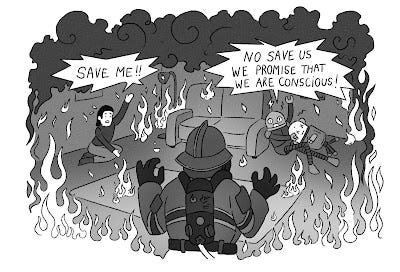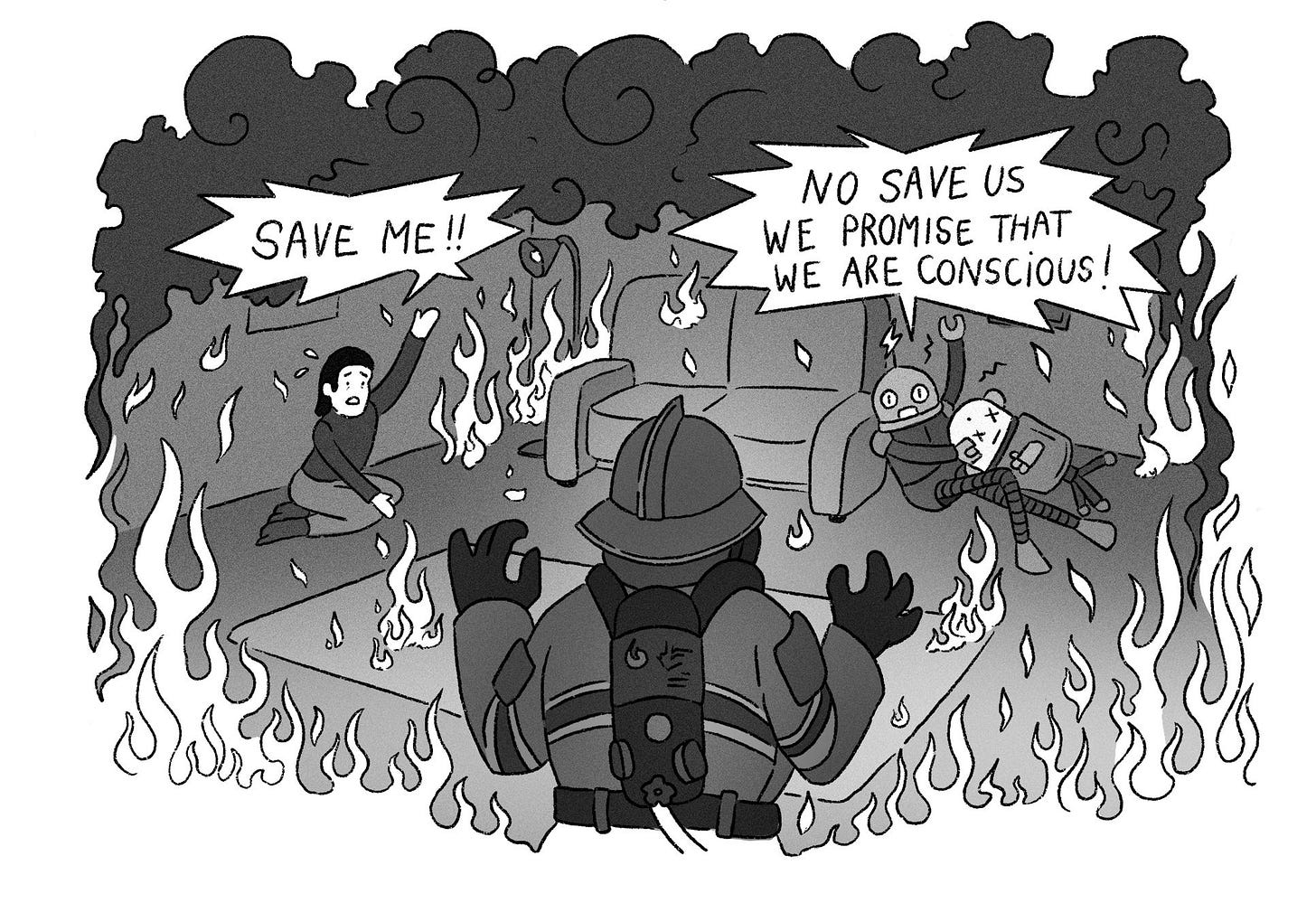You're a firefighter in the year 2050 or 2100. You can rescue either one human, who is definitely conscious, or two futuristic robots, who might or might not be conscious. What do you do?
[Illustration by Nicolas Demers, from my newest book, The Weirdness of the World, to be released Jan 16 and available for pre-order now.]
Suppose you think there's a 75% chance that the robots have conscious lives as rich as those of human beings (or, alternatively, that they have whatever else it takes to have "full moral status" equivalent to that of a human). And suppose you think there's a 25% chance that the robots are the moral equivalent of toasters, that is, mere empty machines with no significant capacity for conscious thought or feeling.
Arguably, if you save the robots and let the human die, you maximize the total expected number of humanlike lives saved (.75 * 2 + .25 * 0 = 1.5 expected lives saved, vs. one life for sure if you save the human). Decision-theoretically, it looks similar to choosing an action with a 75% chance of saving two people over an action that will save one person for sure. Applying similar reasoning, if the credences are flipped (25% chance the robots are conscious, 75% they're not), you save the human.
Generalizing: Whatever concern you have for an ordinary human, or whatever you would give on their behalf, multiply that concern by your credence or degree of belief that the robot has human-like consciousness (or alternatively your credence that it has whatever features justify moral consideration similar to that of a human). If you'd give $5 to a human beggar, give $3 to a robot beggar in the same situation, if you think it's 60% likely the robot has human-like consciousness. If an oversubscribed local elementary school has a lottery for admission and resident human children each get a 50% chance of admission, resident robot children of disputable consciousness would get a proportionately reduced chance.
Call this approach credence-weighted robot rights.
I see a least three problems with credence-weighted robot rights:
(1.) Credence-weighted robot rights entail that robots will inevitably be treated as inferior, until we are 100% confident that they are our equals.
Of course it's reasonable to treat robots as inferior to humans now. We should save the person, not the robot, in the fire. And of course if we ever create robots who are beyond all reasonable doubt our equals, we should treat them as such. I'm hypothesizing instead a tricky in-between case -- a period during which it's reasonably disputable whether or not our machines deserve full moral status as our equals, a period during which liberals about robot consciousness and robot rights regard robots as our fully-conscious moral peers, while conservatives about robot consciousness and robot rights regard them as mindless machines to be deployed and discarded however we wish.
If we choose a 75% chance of rescuing two people over a sure-fire rescue of one person, we are not treating the unrescued person as inferior. Each person's life is worth just as much in our calculus as that of the others. But if we rescue five humans rather than six robots we regard as 80% likely to be conscious, we are treating the robots as inferior -- even though, by our own admission, they are probably not. It seems unfortunate and less than ethically ideal to always treat as inferiors entities we regard as probably our equals.
(2.) Credence-weighted robot rights would engender chaos if people have highly variable opinions. If individual firefighters make the choices based on their personal opinions, then one firefighter might save the two robots while another saves the one human, and each might find the other's decision abhorrent. Stationwide policies might be adopted, but any one policy would be controversial, and robots might face very different treatment in different regions. If individual judges or police were to apply the law differently based on their different individual credences, or on the variable and hard-to-detect credences of those accused of offences against robots, that would be unfair both to the robots and to the offenders, since the penalty would vary depending on who happened to be the officer or judge or whether they travel in social circles with relatively high vs. low opinions of robot consciousness. So presumably there would have to be some regularization by jurisdiction. But still, different jurisdictions might have very different laws concerning the demolition or neglectful destruction of a robot, some treating it as 80% of a homicide, others treating it as a misdemeanor -- and if robot technologies are variable and changing, the law, and people's understanding of the law, might struggle to keep up and to distinguish serious offences from minor ones.
(3.) Chaos might also ensue from the likely cognitive and bodily diversity of robots. While human cognitive and bodily variability typically keeps within familiar bounds, with familiar patterns of ability and disability, robots might differ radically. Some might be designed with conscious sensory experiences but no capacity for pain or pleasure. Others might experience intense pain or pleasure but lack cognitive sophistication. Others might have no stable goals or model their goals wholly on instructions from a human to whom they are gladly, perhaps excessively subservient, insufficiently valuing their own life. Still others might be able to merge and divide at will, or back themselves up, or radically reformat themselves, raising questions about the boundaries of the individual and what constitutes death. Some might exist entirely as computational entities in virtual paradises with little practical connection to our world. All this raises the question of what features are necessary for, and what constitutes, "equal" rights for robots, and whether thresholds of equality even make sense. Our understanding might require a controversial multidimensional scalar appreciation of the grounds of moral status.
Other approaches have their own problems. A precautionary principle that grants fully human equal rights as soon as it's reasonable to think that robots might deserve them risks sacrificing substantial human interests for machines that very likely don't have interests worth the sacrifice (letting a human die, for example, to save a machine that's only 5% likely to be conscious), and it perhaps makes the question of the grounds of moral status in the face of future robots' cognitive diversity even more troubling and urgent. Requiring proof of consciousness beyond reasonable doubt aggravates the issue of treating robots as subhuman even if we're pretty confident they deserve equal treatment. Treating rights as a negotiated social construction risks denying rights to entities that really do deserve rights, based on their intrinsic conscious capacities, if we collectively choose as a matter of social policy not to grant those rights.
The cleanest solution would be what Mara Garza and I have called the Design Policy of the Excluded Middle: Don't create AI systems whose moral status is dubious and confusing. Either create only AI systems that we recognize as property without human-like moral status and rights, and treat them accordingly; or go all the way to creating AI systems with a full suite of features that enable consensus about their high moral status, and then give them the rights they deserve. It's the confusing cases in the middle that create trouble.
If AI technology continues to advance, however, I very much doubt that it will do so in accord with the Design Policy of the Excluded Middle -- and thus we will be tossed into moral confusion about how to treat our AI systems, with no good means of handling that confusion.
-------------------------------------------------------------
Related:
The Weirdness of the World, Chapter 11 (forthcoming), Princeton University Press.
The Full Rights Dilemma for AI Systems of Debatable Moral Personhood, Robonomics, 4 (2023), #32.
How Robots and Monsters Might Break Human Moral Systems (Feb 3, 2015)
Designing AI with Rights, Consciousness, Self-Respect, and Freedom (2020) (with Mara Garza), in S. Matthew Liao, ed., The Ethics of Artificial Intelligence, Oxford University Press.





I feel like there are even more obvious arguments against credence-based weighting.
1) People don't think like that. An individual human faced with an individual robot will come to a judgment of whether that robot is conscious/deserving of moral consideration. People generally don't hold "schrodinger's consciousness" views of the entities around them (though I have to admit, we do seem to place people we've never met in a separate category that is less black-and-white).
2) The law can't work that way. Faced with a situation like a man punching a robot or a robot punching a man, a judge and jury will have to make a decision on whether the robot is responsible for its own actions or not. They can't make 50-50 decisions; there either is liability or there isn't. And the problem of legal precedent leads to...
3) *That* example from history. It's not such a bad thing to learn the lessons of history, and when you look at just how bad the 3/5 of a person thing turned out to be, it seems like a good reason to avoid trying it again.
I still agree with your conclusion (in theory, though there's little hope of it being implemented in practice), just for different reasons.
Thinking about how little hope there is of your design policy being respected: just look at how the new AIs have been constructed, by averaging out *human* language. AI designers are almost entirely concerned with making AI in our own image. This is understandable because we're the best and only example of intelligence that we know; but it also means that they're guaranteed to look a bit like us even when they're not actually anything like us.
Has any philosopher defended the assumption that it is possible to meaningfully assign numerical credences to competing philosophical views? (By "philosophical," I mean something like "not empirically or computationally resolvable.")
It seems obvious to me that this sort of talk is never going to get off the ground, but perhaps I'm missing something.